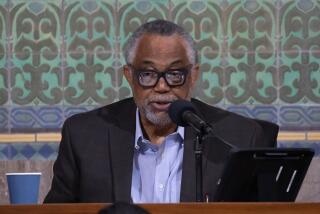Federal Court Biased, Claims Another Clerk
- Share via
A second clerk at the U.S. District Court filed a complaint Tuesday alleging racial discrimination in employment by the court clerk’s office.
Nicolas Britto of San Diego charged in a letter to Chief U.S. District Judge Gordon Thompson Jr. that he has been subjected to “reprisal and retaliation” for testifying on behalf of a black co-worker who claimed last year that he was passed over for promotions because of his race.
In the letter, Britto, founder and president of the Cuban-American Political Assn., said non-minority employees were given preferential treatment in the clerk’s office. He also alleged that there was “a continuous pattern and practice of discrimination in this office against all minorities.”
Thompson confirmed that he had received Britto’s letter but said it would not be considered a formal complaint under the court’s equal employment opportunity grievance procedures. Court rules require that such complaints be submitted to Chief Clerk William Luddy, the court’s equal opportunity coordinator, Thompson explained.
Britto, 35, said he submitted the complaint to Thompson and not Luddy because he was accusing Luddy of discrimination.
“He cannot be fair because the complaint is being made against him,” Britto said.
Luddy said Tuesday that he knew nothing about the complaint and would not comment on any allegations raised against his office.
Britto testified in a November hearing before Thompson on a request by Eddie Stewart, a black court clerk, that his score be raised on an employment evaluation used in promotion decisions.
Though Stewart’s grievance was not submitted as a formal discrimination charge, his attorneys--who volunteered to represent him on behalf of two organizations of black lawyers--said racial discrimination by the clerk’s office was at the heart of the complaint.
The lawyers alleged that there was “a systematic pattern of discrimination” in the clerk’s office, reflected in the fact that no blacks held the most coveted clerking jobs and that top management in the office was “100% white and 99% white male.”
Thompson last month directed Luddy to raise Stewart’s job evaluation but said his decision was based solely on a supervisor’s admission that Stewart deserved a higher score. The judge said there was no evidence of discrimination in the court and that Stewart’s attorneys may have raised racial issues to gain a tactical edge in the job-evaluation case.
More to Read
Sign up for Essential California
The most important California stories and recommendations in your inbox every morning.
You may occasionally receive promotional content from the Los Angeles Times.












